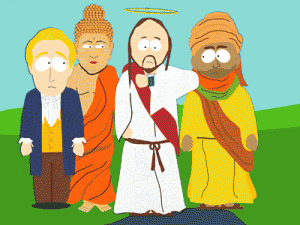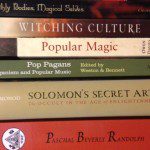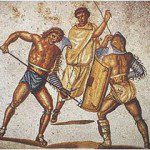 This past Monday night I turned my brain into the “off” position to watch a football documentary. At one point in the documentary a very well known player shows up on screen wearing a “Psalm 91” t-shirt. The player in question had recently been “born again” and had been extremely loud about it in interviews and with teammates. I have no problem with people choosing to embrace Jesus or choosing to walk with him a second time, but the image put an end to my thinking sabbatical and made me wonder “what would it be like if really had religious choice in the United States?”
This past Monday night I turned my brain into the “off” position to watch a football documentary. At one point in the documentary a very well known player shows up on screen wearing a “Psalm 91” t-shirt. The player in question had recently been “born again” and had been extremely loud about it in interviews and with teammates. I have no problem with people choosing to embrace Jesus or choosing to walk with him a second time, but the image put an end to my thinking sabbatical and made me wonder “what would it be like if really had religious choice in the United States?”
Certainly we are free to worship (and not worship) as we choose, and America is full of various religions as a consequence. We are a nation of Muslims, Jews, Christians, Mormons, Pagans, Hindus, and more. The majority of those faiths are made up of people born into them. Certainly people convert to other religions, but I’m willing to bet they are the statistical exception in the United States. Most people end up following the religion of their parents, or perhaps a socially approved alternative (which is why it’s OK to go from being a Methodist to an Evangelical).
Thinking about the football player on my TV, it occurred to me that his religious choices were probably limited. I’m going to assume he grew up in a nominally Christian household, and that as a football player he was often exposed to Christianity. (Football is a traditionally conservative institution and every college and NFL locker room has at least one true believer around.) When deciding that he needed spiritual direction in his life it seems probable that the only religions he had ever encountered in a significant and non-biased way were Christianity, Islam, and perhaps Judaism. I have yet to meet a Wiccan NFL quarterback.
 Despite the stupid that often comes from the mouths of the far-Christian-right, most people are not really exposed to alternative religions, especially away from the coasts. The majority of retail establishments cater to Christian (and sometimes Jewish) religious traditions. (Good luck finding an Imbolc card.) Television specials and news programming also cater to a “Judeo-Christian*” audience (and that’s why we’re still waiting for an Aleister Crowley miniseries while the “Bible Par Two” will air on network TV). Some faiths, like Islam and Hinduism for example, are extremely visible in certain ares of the United States, and then vilified or completely ignored in others. Only Christianity is truly “nation-wide” as a religious grouping.
Despite the stupid that often comes from the mouths of the far-Christian-right, most people are not really exposed to alternative religions, especially away from the coasts. The majority of retail establishments cater to Christian (and sometimes Jewish) religious traditions. (Good luck finding an Imbolc card.) Television specials and news programming also cater to a “Judeo-Christian*” audience (and that’s why we’re still waiting for an Aleister Crowley miniseries while the “Bible Par Two” will air on network TV). Some faiths, like Islam and Hinduism for example, are extremely visible in certain ares of the United States, and then vilified or completely ignored in others. Only Christianity is truly “nation-wide” as a religious grouping.
Even here on Patheos I sometimes feel like an outsider. I’ve had a lot of my articles on the front page of the website, and due to that I’ve reached a larger audience than I ever could have imagined just two years ago, but there are times when it’s painfully obvious that I’m living in an online world dominated by just one religion. The vast majority of the books we are asked to review site wide generally have a Christian bent, and the Patheos What Do I Really Believe Series? asked a lot of questions that generally have no relevance to Pagans. I don’t think this is representative of some sort of dastardly plot against Pagans, but it does illustrate just how unequal the playing field is when it comes to religious discourse.
This is why I believe my football player didn’t really have a choice when it came to choosing a faith. If he wanted to be religious it was basically Christianity or the high-way. Picking another faith might have meant being ostracized in the locker room and could have resulted in less lucrative endorsement opportunities. There’s also the difficulty in simply finding out about alternative religious choices.
I know what you are thinking “I got here, it can’t be that difficult” but I would argue that it actually is. Coming to Paganism requires a certain type of thinking. You have to be inquisitive, open-minded, and not completely satisfied with the status quo. You have to wade into certain areas of the internet (and formerly, the bookstore) that most people just don’t go to. Google the word “Pagan” and you’ll get several definitions of the word (with some being better than others) and lots of news about San Francisco Giants outfielder “Angel Pagan.” The seventh entry for the word comes from the Catholic Encyclopedia, and I’m sure that’s completely bias free. It takes a certain kind of personality just to find Modern Paganism, let alone embrace it or understand it.
 Certainly we are more visible today than in the past, but “entertainments” (whether they be books, movies, or television shows) generally appeal to niche audiences. Fifty million people no longer watch the same program (unless it’s football, seriously) or read the same book, so while we might end up on television only a million people might be watching, and those shows might just be preaching to the choir. Even if someone completely oblivious to Paganism does end up watching the Biography Channel’s Witches special, it doesn’t mean they’ll end up actively engaged. I’ve watched shows on the Baha’i Faith and it didn’t immediately make me want to run out and learn more.
Certainly we are more visible today than in the past, but “entertainments” (whether they be books, movies, or television shows) generally appeal to niche audiences. Fifty million people no longer watch the same program (unless it’s football, seriously) or read the same book, so while we might end up on television only a million people might be watching, and those shows might just be preaching to the choir. Even if someone completely oblivious to Paganism does end up watching the Biography Channel’s Witches special, it doesn’t mean they’ll end up actively engaged. I’ve watched shows on the Baha’i Faith and it didn’t immediately make me want to run out and learn more.
The hardest part about accepting an alternative faith as your own might come during the inevitable “judgement moments” most of us have to go through. How many people out there have had bad experiences with friends or family after embracing Paganism? I’ve lost people I love due to my religious choice, and a lot of my peers from high school just don’t know what to think of me these days. I’m sure there are individuals out there who just can’t deal with losing the people they love and therefore retreat from less mainstream religions. There are also the folks who are forced to live in the broom closet due to their spiritual choices. I live in liberal progressive California and I know people who are forced to hide their religious choice because they work for overly religious Christians. Sure, there are laws against firing someone over their religion, but who wants to test that in this economy? It’s just not always so easy.
 All of that’s why I’m not sure we have true religious choice in America. Even people in the entertainment industry (a notoriously liberal institution) are hesitant to come out as belonging to an alternative faith. (That’s why actors who seem “Pagan” never admit to it, and why Will Smith has been mum about Scientology.) There are all sorts of factors that negate religious choice in the United States, and even more variables that make admitting to things outside the mainstream problematic. Perhaps one of the reasons we don’t teach “comparative religion” in our public schools is because it would expose young people to ideas that might challenge the status quo. One religion has a near monopoly when it comes to controlling religious discourse, and a lot of those folks are not the type to share and play nicely with others.
All of that’s why I’m not sure we have true religious choice in America. Even people in the entertainment industry (a notoriously liberal institution) are hesitant to come out as belonging to an alternative faith. (That’s why actors who seem “Pagan” never admit to it, and why Will Smith has been mum about Scientology.) There are all sorts of factors that negate religious choice in the United States, and even more variables that make admitting to things outside the mainstream problematic. Perhaps one of the reasons we don’t teach “comparative religion” in our public schools is because it would expose young people to ideas that might challenge the status quo. One religion has a near monopoly when it comes to controlling religious discourse, and a lot of those folks are not the type to share and play nicely with others.
Can you even imagine a truly post-Christian United States? A nation full of people with an understanding of faith traditions outside of their own, with temples, mosques, groves, and churches dotting the downtowns of Main Street, Anytown USA. Religious programs about Pagans outside of Halloween and mentions of Islam outside the contexts of terrorism and Middle East policy. Perhaps one day we’d even live in a land that understood that Sikhs aren’t Muslims or Hindus. Then there are the images of families full of believers from across the religious spectrum and of course NFL Players with shirts that say “An it harm none” instead of “Psalm 29.”
*One of my college professor friends hates the term Judeo-Christian. I generally do too, but it’s a lazy way of getting my point across.













